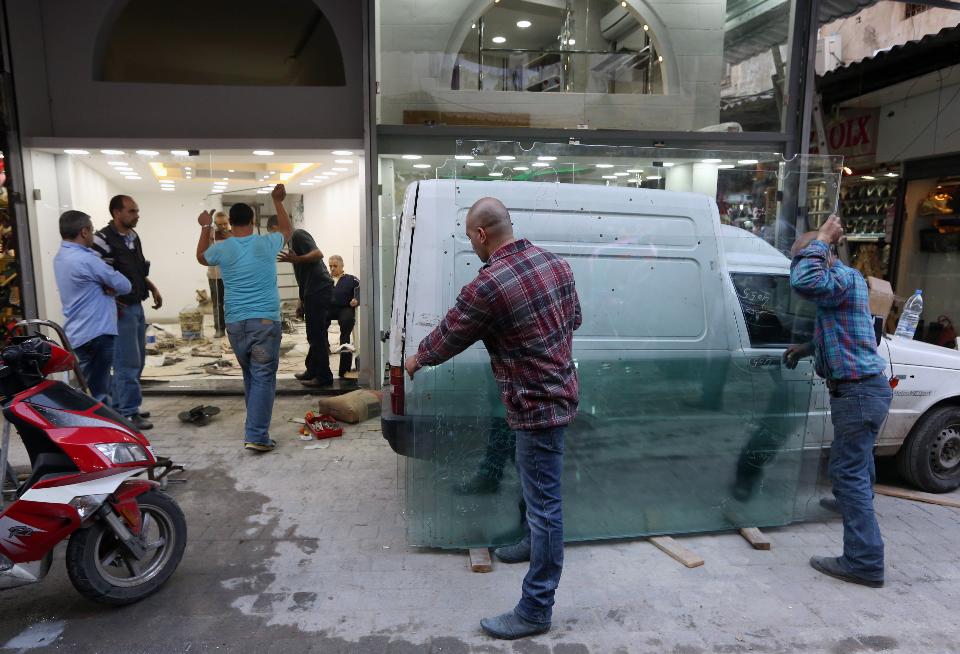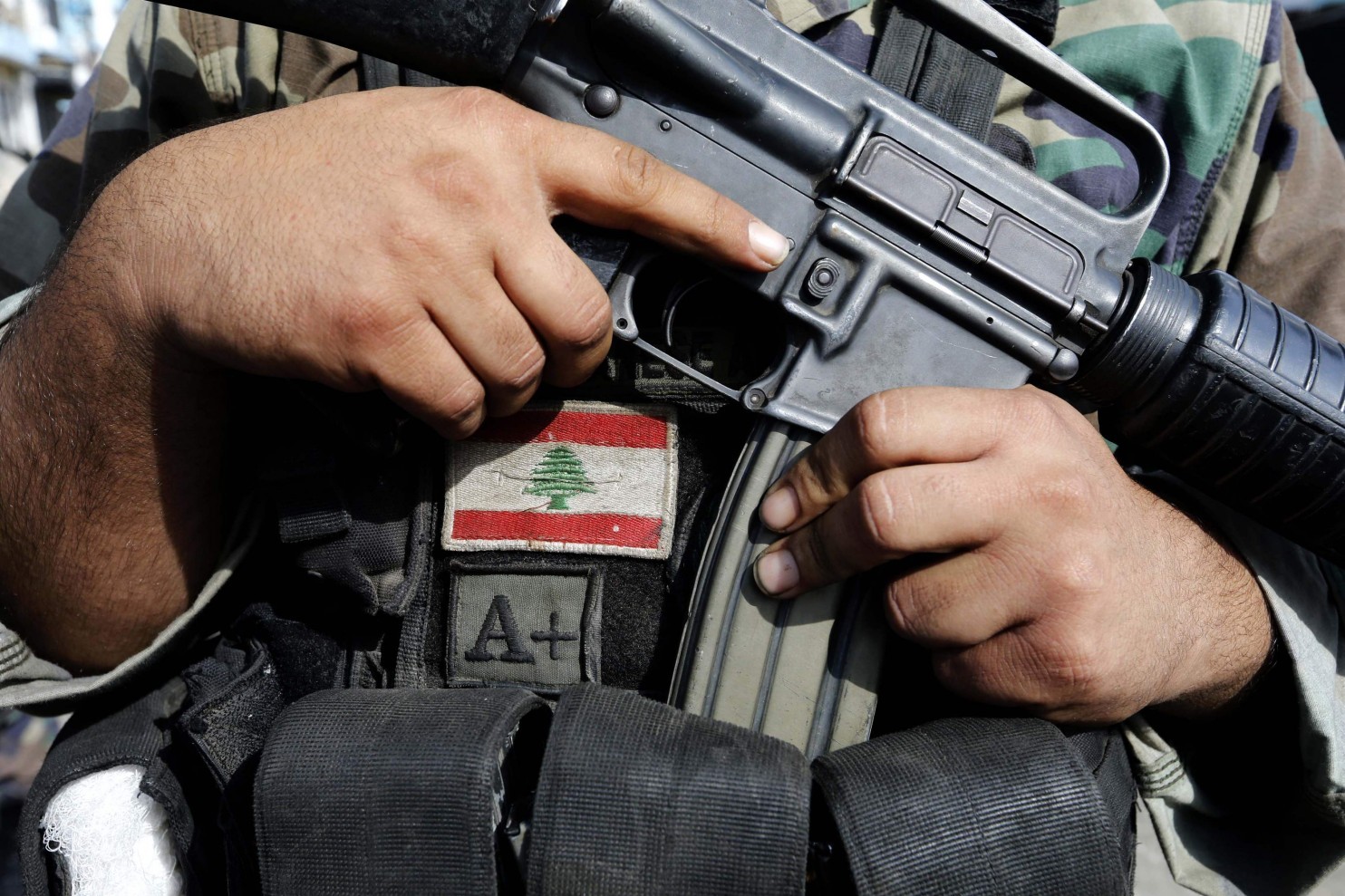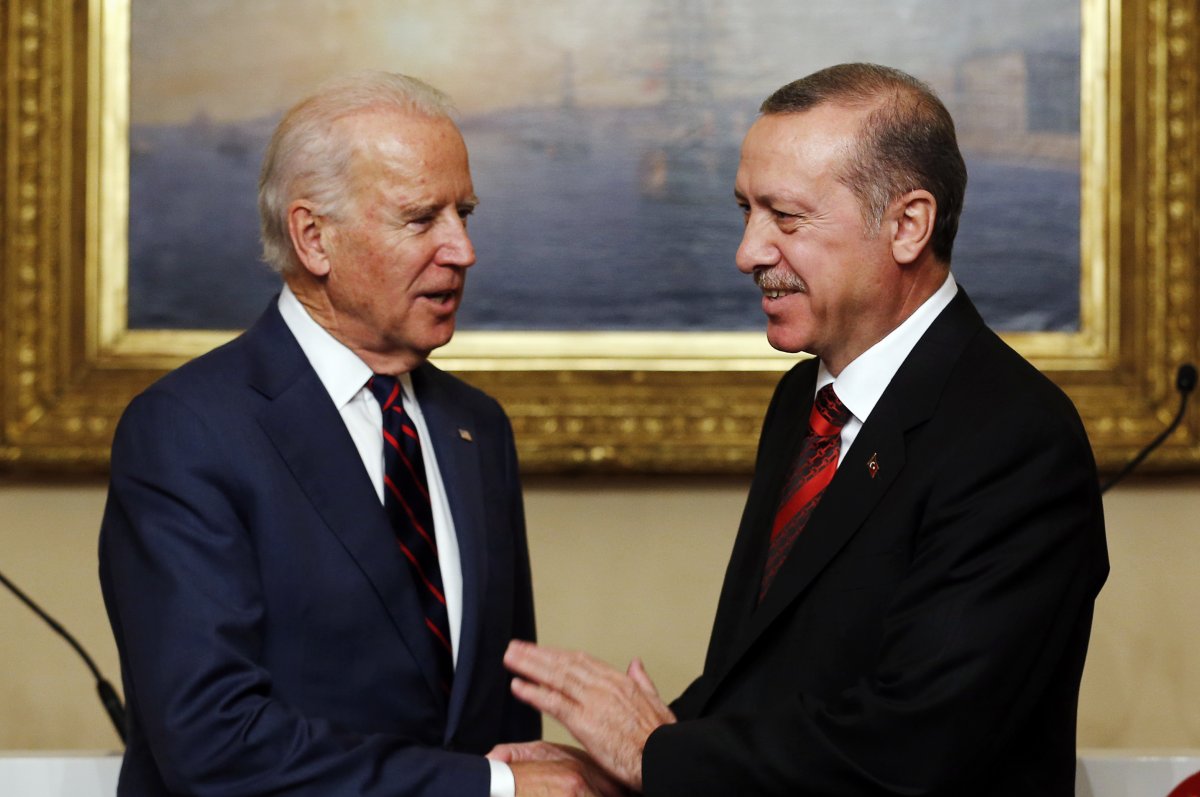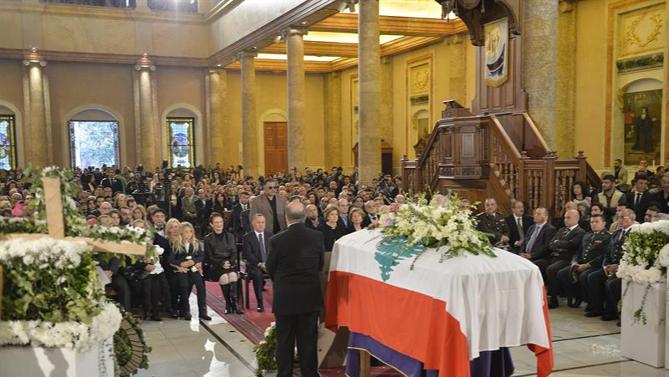
XWH11. Beirut (Lebanon), 30/11/2014.- Family members and friends attend a funeral procession for Lebanese singer Sabah, as her coffin draped with the national flag is placed at the Saint George Church in downtown Beirut, Lebanon, 30 November 2014. According to media reports Sabah, whose real name is Jeanette Gergis al-Feghali died on 26 November 2014 at the age of 87. She launched her singing and acting career in the early 50s, quickly becoming a household name in much of the Arab world. (Líbano) EFE/EPA/WAEL HAMZEH
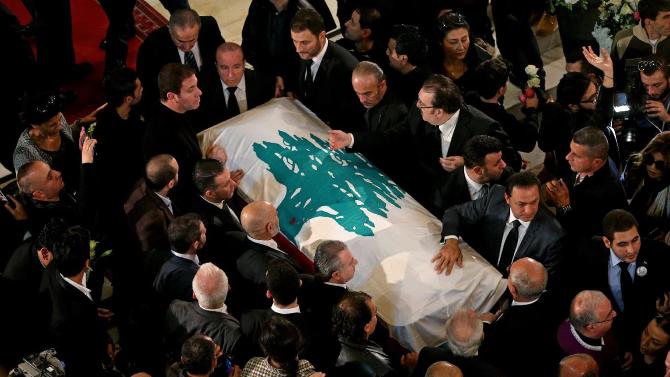
Friends and relatives of Lebanese singer and actress Sabah, gather around her coffin during her funeral procession, at St. George Cathedral in downtown Beirut, Lebanon, Sunday Nov. 30, 2014. The daylong proceedings took on a festive air the crowds celebrated the taboo-breaking six-decade career of Sabah, who died Wednesday at the age of 87. A military brass band played in the street outside St. George Cathedral, where fans clapped and sang their favorite Sabah songs. (AP Photo/Hussein Malla)
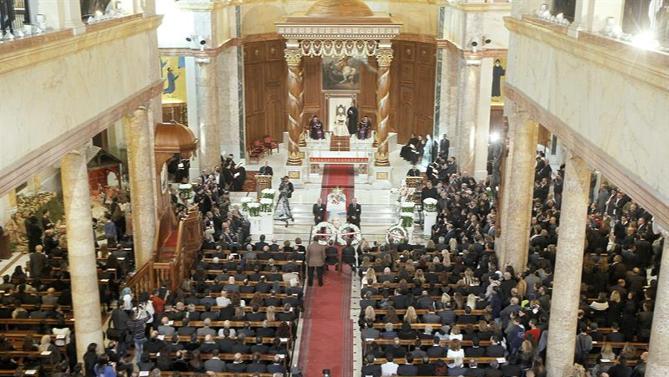
XNM01. Beirut (Lebanon), 30/11/2014.- Lebanese patriarch Bchara Rai (C-back) prays next to the coffin of Lebanese artist and actress Sabah during her funeral in saint Georges church in down town Beirut, Lebanon, 30 November 2014. According to media reports Sabah, whose real name is Jeanette Gergis al-Feghali died on 26 November 2014 at the age of 87. She launched her singing and acting career in the early 50s, quickly becoming a household name in much of the Arab world. (Líbano) EFE/EPA/NABIL MOUNZER
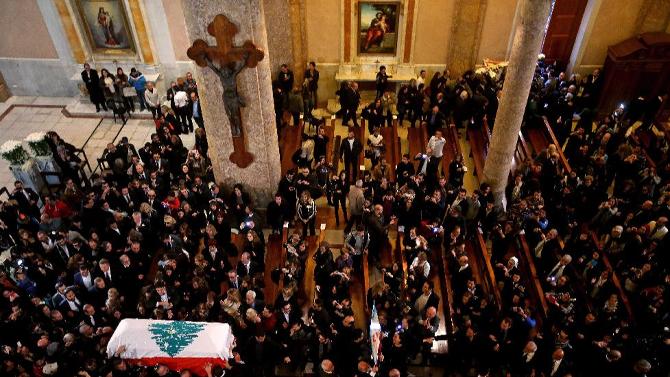
Friends and relatives of Lebanese singer and actress Sabah, carry her coffin during her funeral procession, at St. George Cathedral in downtown Beirut, Lebanon, Sunday Nov. 30, 2014. The daylong proceedings took on a festive air the crowds celebrated the taboo-breaking six-decade career of Sabah, who died Wednesday at the age of 87. A military brass band played in the street outside St. George Cathedral, where fans clapped and sang their favorite Sabah songs. (AP Photo/Hussein Malla)
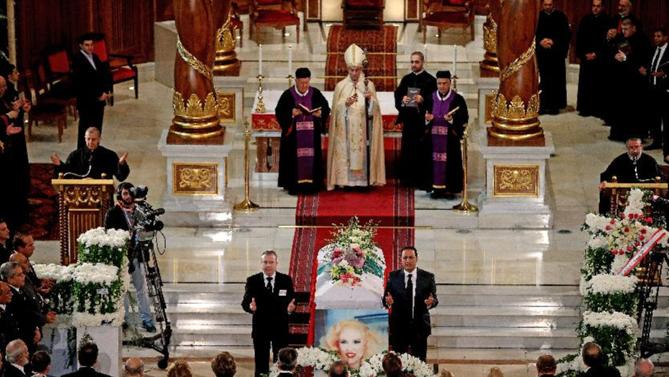
Maronite Patriarch Bechara Rai, background center, leads prayers during the funeral procession of Lebanese singer and actress Sabah, at the St. George Cathedral in downtown Beirut, Lebanon, Sunday Nov. 30, 2014. The daylong proceedings took on a festive air the crowds celebrated the taboo-breaking six-decade career of Sabah, who died Wednesday at the age of 87. A military brass band played in the street outside St. George Cathedral, where fans clapped and sang their favorite Sabah songs. (AP Photo/Hussein Malla)
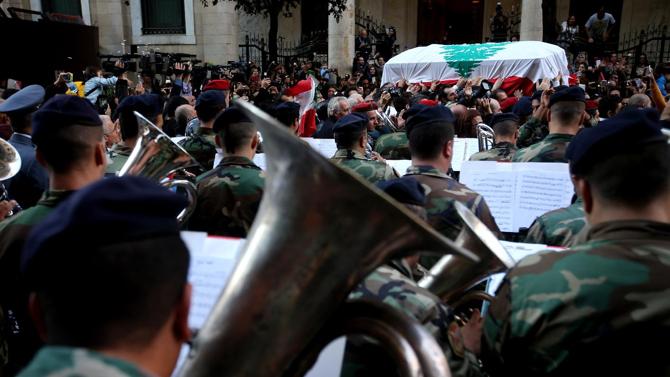
Lebanese army musicians perform songs of singer and actress Sabah, an icon of Arab music, during her funeral procession, outside the St. George Cathedral in downtown Beirut, Lebanon, Sunday, Nov. 30, 2014. The daylong proceedings took on a festive air the crowds celebrated the taboo-breaking six-decade career of Sabah, who died Wednesday at the age of 87. A military brass band played in the street outside St. George Cathedral, where fans clapped and sang their favorite Sabah songs. Sabah died Wednesday at the age of 87. (AP Photo/Hussein Malla)
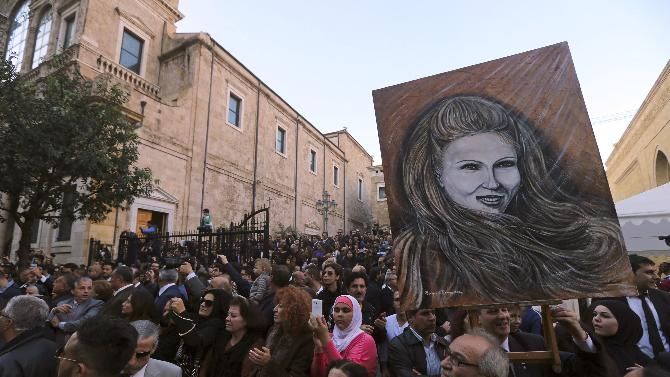
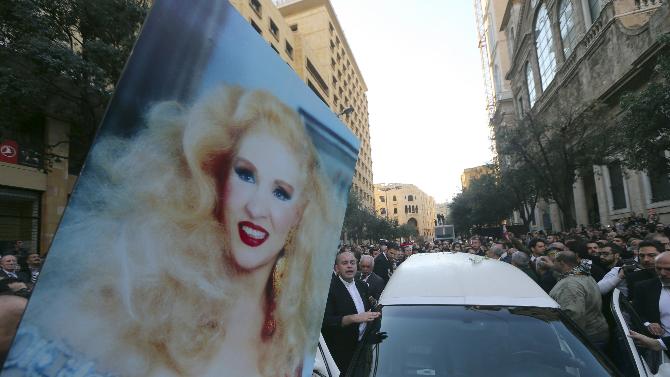
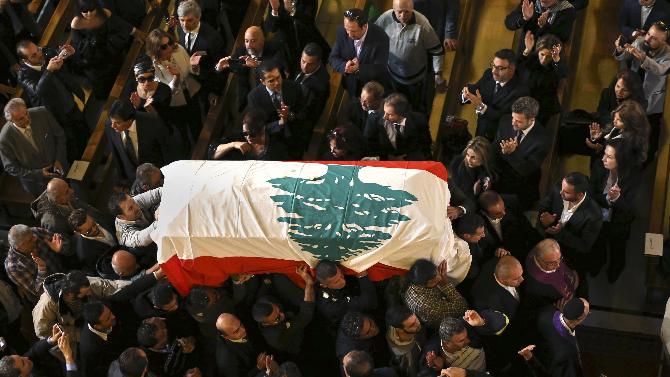
Friends and relatives of Lebanese singer and actress Sabah, an icon of Arab music, carry her coffin wrapped with the Lebanese flag, as other applaud during her funeral procession, at the St. George Cathedral in downtown Beirut, Lebanon, Sunday Nov. 30, 2014. The daylong proceedings have taken on a festive air as friends, relatives and fans celebrate Sabah’s storied and taboo-breaking six-decade career. Earlier in the day, traditional dancers performed to the singer’s songs played from loudspeakers. (AP Photo/Hussein Malla)
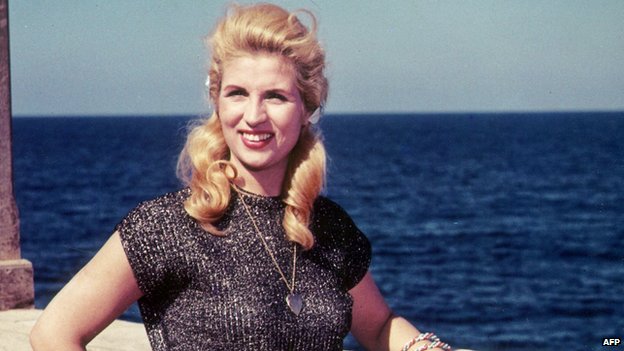
Sabah posing in the 1960s on the set of a film in the Mediterranean port city of Alexandria
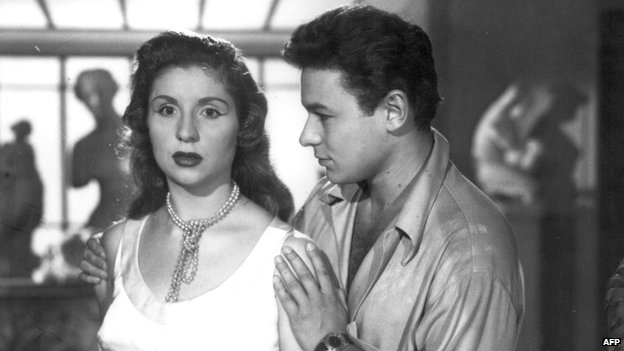
Sabah acted several times with Egyptian heart-throb Ahmad Ramzi
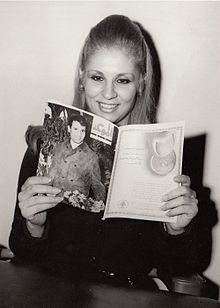
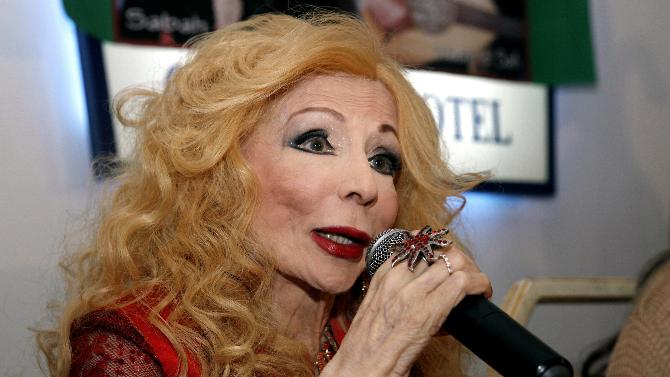
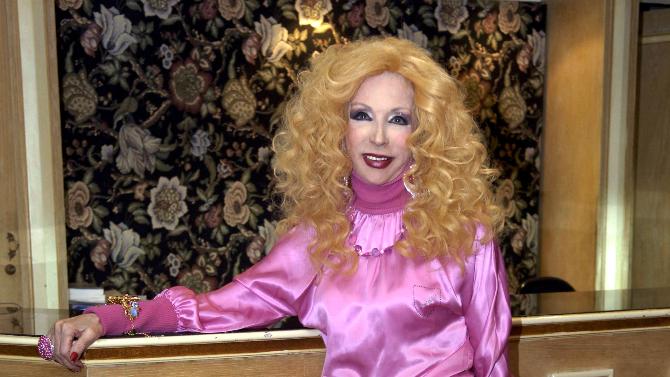
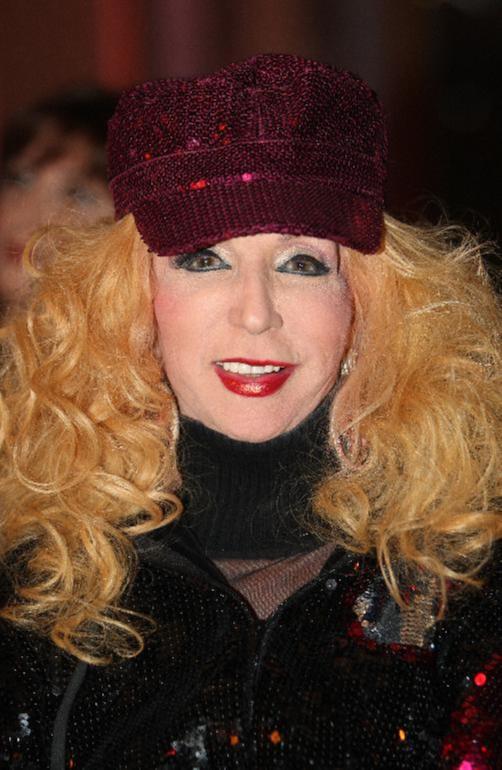
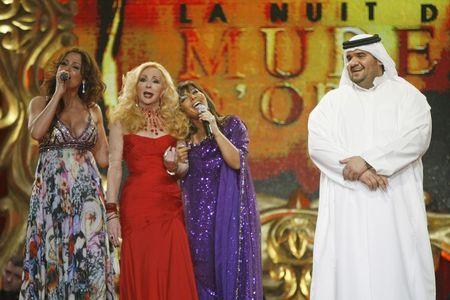
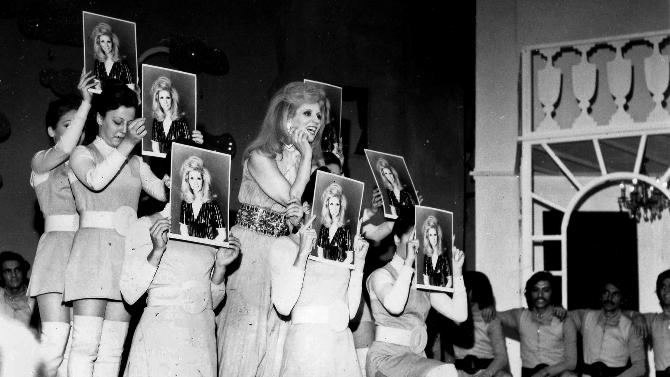
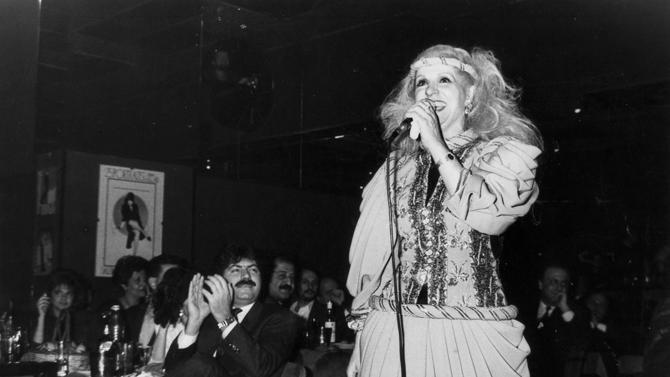
Song and dance shattered the usual Sunday quiet in Downtown Beirut, with citizens, musicians, public figures, former colleagues of the diva and her relatives celebrating the life of figure whose impact transcended borders.
The mood inside Saint George Church where her funeral mass was more toned down, with a sermon by Maronite Patriarch Beshara Rai.
Sabah’s coffin arrived in a white hearse covered with white flowers, which led a convoy of five black hearses carrying the wreaths that had the names of nearly all of Lebanon’s most known figures. Among the names were those of former prime minister Saad Hariri, Speaker Nabih Berri, Free Patriotic leader Michel Aoun, Lebanese Forces leader Samir Geagea, and Army Commander Gen. Jean Kahwagi.
Perhaps the most touching of all tags was the one written by the other legendary icon of Lebanese art, Fairouz.
“Your sun never sets,” she wrote.
Prime Minister Tammam Salam also carried a wreath for her at the funeral, after many of his Cabinet ministers arrived to pay their respects.
“It is just normal that a person, who filled the hearts of all the Lebanese with joy and life, is remembered by all these people in her final day,” MP Elie Keyrouz, observing the huge line of wreaths and reading their tags, told The Daily Star. “But it’s unfortunate that Lebanon is incomplete at this moment. It’s sad that there is no president to tell her goodbye.”
Trying to fight back tears with smiles, Alia, a 70-year-old long-time fan of the artist, nicknamed Sabbouha, found it difficult to find words to express her emotions.
“More than anyone in the whole world, Sabah brought happiness to the hearts of every single person who heard her songs,” she said. “I, and millions like me, would have not enjoyed our youth so much if not for her.”
But not only those who had the chance to grow up in Sabah’s golden years were influenced by her. Many youths rushed down with their parents to Downtown Beirut, sang her songs and threw flowers on her convoy.
The glory of the moment eclipsed its sadness, which left space for each to manifest it in their own way.
Dabke dancers jolted with the sound of her music; singers recited parts of her most notable songs for TV reporters, while the Army brought its orchestra to play the her music in remarkable precedent.
Dressed in black from head to toe and wearing shoes with wooden heels, a woman surprised the crowd when she started performing a flamenco dance in harmonious rhythm.
Sabbouha’s coffin, draped with a Lebanese flag and covered with white flowers, was carried into the hall of the Saint George Church, where the Patriarch Rai prepared to lead mass.
The church was packed with hundreds of admirers, some of whom watched from the high balconies.
Sabah’s portraits showing her charming smile occupied every corner of the church, from its gates, to the walls of its outdoor hall, to the pins so proudly displayed by her fans.
“She should be remembered every day, in every home, and by everyone who appreciates what she gave us,” Darine Hadchiti, a Lebanese celebrity and singer, told The Daily Star.
For Hadchiti, Lebanon’s modern singers and actresses have a very important lesson to learn from Shahroura, another nickname, meaning singing bird in Arabic.
“It’s all about modesty,” she said. “If Sabah’s character was not so extraordinarily modest, you wouldn’t have seen all these people coming here just to express how much respect they have for her.”
The funeral convoy carrying Sabah’s coffin had departed around noon from her residence in the Comfort Hotel in Hazmieh, where hundreds of her neighbors flooded the streets to say their goodbyes.
Born Jeanette Feghali in Bdadoun, a town in Aley, the star who passed away at the age 87 was the first Arab singer to perform at Olympia in Paris, Carnegie Hall in New York, Piccadilly Theater in London and the Sydney Opera House in Australia.
She has starred in 83 films (Lebanese and Egyptian) and 27 Lebanese plays. Sabah also has over 3,000 Lebanese and Egyptian songs. She received many awards during her lengthy career, including one from The Dubai International Film Festival and another by former Lebanese President Michel Sleiman at the Beiteddine Art Festival. She was also honored by the Egyptian Cinema in Cairo in Beirut with a statue.
She is survived by her son, Dr. Sabah Shammas, from her first marriage to Najib Shammas, and her daughter Howeida, from her marriage to Egyptian violinist Anwar Mansi.
– See more at: http://www.dailystar.com.lb/News/Lebanon-News/2014/Nov-30/279378-hundreds-pay-tribute-to-sabah-at-beirut-funeral.ashx#sthash.rbfQNeuS.dpuf
BEIRUT (AP) — Hundreds of friends, family and fans packed into a Beirut church Sunday to say farewell to the famed Lebanese singer, actress and entertainer Sabah. The daylong proceedings took on a festive air as the crowds celebrated the taboo-breaking six-decade career of Sabah, who died Wednesday at the age of 87. A military brass band played in the street outside St. George Cathedral in downtown Beirut, where fans clapped and sang their favorite Sabah songs. Earlier, a troupe of dancers in traditional dress performed to the diva’s music played from loudspeakers. "I will call it celebration not a funeral," said Lebanese actress Ward El-Khal. "We feel today that we came here to share her feelings and to remember her. We will miss her."
Daily Star – Nizar Hassan
Song and dance shattered the usual Sunday quiet in Downtown Beirut, with citizens, musicians, public figures, former colleagues of the diva and her relatives celebrating the life of figure whose impact transcended borders.
The mood inside Saint George Church where her funeral mass was more toned down, with a sermon by Maronite Patriarch Beshara Rai.
Sabah’s coffin arrived in a white hearse covered with white flowers, which led a convoy of five black hearses carrying the wreaths that had the names of nearly all of Lebanon’s most known figures. Among the names were those of former prime minister Saad Hariri, Speaker Nabih Berri, Free Patriotic leader Michel Aoun, Lebanese Forces leader Samir Geagea, and Army Commander Gen. Jean Kahwagi.
Perhaps the most touching of all tags was the one written by the other legendary icon of Lebanese art, Fairouz.
“Your sun never sets,” she wrote.
Prime Minister Tammam Salam also carried a wreath for her at the funeral, after many of his Cabinet ministers arrived to pay their respects.
“It is just normal that a person, who filled the hearts of all the Lebanese with joy and life, is remembered by all these people in her final day,” MP Elie Keyrouz, observing the huge line of wreaths and reading their tags, told The Daily Star. “But it’s unfortunate that Lebanon is incomplete at this moment. It’s sad that there is no president to tell her goodbye.”
Trying to fight back tears with smiles, Alia, a 70-year-old long-time fan of the artist, nicknamed Sabbouha, found it difficult to find words to express her emotions.
“More than anyone in the whole world, Sabah brought happiness to the hearts of every single person who heard her songs,” she said. “I, and millions like me, would have not enjoyed our youth so much if not for her.”
But not only those who had the chance to grow up in Sabah’s golden years were influenced by her. Many youths rushed down with their parents to Downtown Beirut, sang her songs and threw flowers on her convoy.
The glory of the moment eclipsed its sadness, which left space for each to manifest it in their own way.
Dabke dancers jolted with the sound of her music; singers recited parts of her most notable songs for TV reporters, while the Army brought its orchestra to play the her music in remarkable precedent.
Dressed in black from head to toe and wearing shoes with wooden heels, a woman surprised the crowd when she started performing a flamenco dance in harmonious rhythm.
Sabbouha’s coffin, draped with a Lebanese flag and covered with white flowers, was carried into the hall of the Saint George Church, where the Patriarch Rai prepared to lead mass.
The church was packed with hundreds of admirers, some of whom watched from the high balconies.
Sabah’s portraits showing her charming smile occupied every corner of the church, from its gates, to the walls of its outdoor hall, to the pins so proudly displayed by her fans.
“She should be remembered every day, in every home, and by everyone who appreciates what she gave us,” Darine Hadchiti, a Lebanese celebrity and singer, told The Daily Star.
For Hadchiti, Lebanon’s modern singers and actresses have a very important lesson to learn from Shahroura, another nickname, meaning singing bird in Arabic.
“It’s all about modesty,” she said. “If Sabah’s character was not so extraordinarily modest, you wouldn’t have seen all these people coming here just to express how much respect they have for her.”
The funeral convoy carrying Sabah’s coffin had departed around noon from her residence in the Comfort Hotel in Hazmieh, where hundreds of her neighbors flooded the streets to say their goodbyes.
Born Jeanette Feghali in Bdadoun, a town in Aley, the star who passed away at the age 87 was the first Arab singer to perform at Olympia in Paris, Carnegie Hall in New York, Piccadilly Theater in London and the Sydney Opera House in Australia.
She has starred in 83 films (Lebanese and Egyptian) and 27 Lebanese plays. Sabah also has over 3,000 Lebanese and Egyptian songs. She received many awards during her lengthy career, including one from The Dubai International Film Festival and another by former Lebanese President Michel Sleiman at the Beiteddine Art Festival. She was also honored by the Egyptian Cinema in Cairo in Beirut with a statue.
She is survived by her son, Dr. Sabah Shammas, from her first marriage to Najib Shammas, and her daughter Howeida, from her marriage to Egyptian violinist Anwar Mansi.
– See more at: http://www.dailystar.com.lb/News/Lebanon-News/2014/Nov-30/279378-hundreds-pay-tribute-to-sabah-at-beirut-funeral.ashx#sthash.rbfQNeuS.dpuf
Song and dance shattered the usual Sunday quiet in Downtown Beirut, with citizens, musicians, public figures, former colleagues of the diva and her relatives celebrating the life of figure whose impact transcended borders.
The mood inside Saint George Church where her funeral mass was more toned down, with a sermon by Maronite Patriarch Beshara Rai.
Sabah’s coffin arrived in a white hearse covered with white flowers, which led a convoy of five black hearses carrying the wreaths that had the names of nearly all of Lebanon’s most known figures. Among the names were those of former prime minister Saad Hariri, Speaker Nabih Berri, Free Patriotic leader Michel Aoun, Lebanese Forces leader Samir Geagea, and Army Commander Gen. Jean Kahwagi.
Perhaps the most touching of all tags was the one written by the other legendary icon of Lebanese art, Fairouz.
“Your sun never sets,” she wrote.
Prime Minister Tammam Salam also carried a wreath for her at the funeral, after many of his Cabinet ministers arrived to pay their respects.
“It is just normal that a person, who filled the hearts of all the Lebanese with joy and life, is remembered by all these people in her final day,” MP Elie Keyrouz, observing the huge line of wreaths and reading their tags, told The Daily Star. “But it’s unfortunate that Lebanon is incomplete at this moment. It’s sad that there is no president to tell her goodbye.”
Trying to fight back tears with smiles, Alia, a 70-year-old long-time fan of the artist, nicknamed Sabbouha, found it difficult to find words to express her emotions.
“More than anyone in the whole world, Sabah brought happiness to the hearts of every single person who heard her songs,” she said. “I, and millions like me, would have not enjoyed our youth so much if not for her.”
But not only those who had the chance to grow up in Sabah’s golden years were influenced by her. Many youths rushed down with their parents to Downtown Beirut, sang her songs and threw flowers on her convoy.
The glory of the moment eclipsed its sadness, which left space for each to manifest it in their own way.
Dabke dancers jolted with the sound of her music; singers recited parts of her most notable songs for TV reporters, while the Army brought its orchestra to play the her music in remarkable precedent.
Dressed in black from head to toe and wearing shoes with wooden heels, a woman surprised the crowd when she started performing a flamenco dance in harmonious rhythm.
Sabbouha’s coffin, draped with a Lebanese flag and covered with white flowers, was carried into the hall of the Saint George Church, where the Patriarch Rai prepared to lead mass.
The church was packed with hundreds of admirers, some of whom watched from the high balconies.
Sabah’s portraits showing her charming smile occupied every corner of the church, from its gates, to the walls of its outdoor hall, to the pins so proudly displayed by her fans.
“She should be remembered every day, in every home, and by everyone who appreciates what she gave us,” Darine Hadchiti, a Lebanese celebrity and singer, told The Daily Star.
For Hadchiti, Lebanon’s modern singers and actresses have a very important lesson to learn from Shahroura, another nickname, meaning singing bird in Arabic.
“It’s all about modesty,” she said. “If Sabah’s character was not so extraordinarily modest, you wouldn’t have seen all these people coming here just to express how much respect they have for her.”
The funeral convoy carrying Sabah’s coffin had departed around noon from her residence in the Comfort Hotel in Hazmieh, where hundreds of her neighbors flooded the streets to say their goodbyes.
Born Jeanette Feghali in Bdadoun, a town in Aley, the star who passed away at the age 87 was the first Arab singer to perform at Olympia in Paris, Carnegie Hall in New York, Piccadilly Theater in London and the Sydney Opera House in Australia.
She has starred in 83 films (Lebanese and Egyptian) and 27 Lebanese plays. Sabah also has over 3,000 Lebanese and Egyptian songs. She received many awards during her lengthy career, including one from The Dubai International Film Festival and another by former Lebanese President Michel Sleiman at the Beiteddine Art Festival. She was also honored by the Egyptian Cinema in Cairo in Beirut with a statue.
She is survived by her son, Dr. Sabah Shammas, from her first marriage to Najib Shammas, and her daughter Howeida, from her marriage to Egyptian violinist Anwar Mansi.
– See more at: http://www.dailystar.com.lb/News/Lebanon-News/2014/Nov-30/279378-hundreds-pay-tribute-to-sabah-at-beirut-funeral.ashx#sthash.rbfQNeuS.dpuf
Song and dance shattered the usual Sunday quiet in Downtown Beirut, with citizens, musicians, public figures, former colleagues of the diva and her relatives celebrating the life of figure whose impact transcended borders. The mood inside Saint George Church where her funeral mass was more toned down, with a sermon by Maronite Patriarch Beshara Rai. Sabah’s coffin arrived in a white hearse covered with white flowers, which led a convoy of five black hearses carrying the wreaths that had the names of nearly all of Lebanon’s most known figures. Among the names were those of former prime minister Saad Hariri, Speaker Nabih Berri, Free Patriotic leader Michel Aoun, Lebanese Forces leader Samir Geagea, and Army Commander Gen. Jean Kahwagi. Perhaps the most touching of all tags was the one written by the other legendary icon of Lebanese art, Fairouz. “Your sun never sets,” she wrote. Prime Minister Tammam Salam also carried a wreath for her at the funeral, after many of his Cabinet ministers arrived to pay their respects. “It is just normal that a person, who filled the hearts of all the Lebanese with joy and life, is remembered by all these people in her final day,” MP Elie Keyrouz, observing the huge line of wreaths and reading their tags, told The Daily Star. “But it’s unfortunate that Lebanon is incomplete at this moment. It’s sad that there is no president to tell her goodbye.” Trying to fight back tears with smiles, Alia, a 70-year-old long-time fan of the artist, nicknamed Sabbouha, found it difficult to find words to express her emotions. “More than anyone in the whole world, Sabah brought happiness to the hearts of every single person who heard her songs,” she said. “I, and millions like me, would have not enjoyed our youth so much if not for her.” But not only those who had the chance to grow up in Sabah’s golden years were influenced by her. Many youths rushed down with their parents to Downtown Beirut, sang her songs and threw flowers on her convoy. The glory of the moment eclipsed its sadness, which left space for each to manifest it in their own way. Dabke dancers jolted with the sound of her music; singers recited parts of her most notable songs for TV reporters, while the Army brought its orchestra to play the her music in remarkable precedent. Dressed in black from head to toe and wearing shoes with wooden heels, a woman surprised the crowd when she started performing a flamenco dance in harmonious rhythm. Sabbouha’s coffin, draped with a Lebanese flag and covered with white flowers, was carried into the hall of the Saint George Church, where the Patriarch Rai prepared to lead mass. The church was packed with hundreds of admirers, some of whom watched from the high balconies. Sabah’s portraits showing her charming smile occupied every corner of the church, from its gates, to the walls of its outdoor hall, to the pins so proudly displayed by her fans. “She should be remembered every day, in every home, and by everyone who appreciates what she gave us,” Darine Hadchiti, a Lebanese celebrity and singer, told The Daily Star.
For Hadchiti, Lebanon’s modern singers and actresses have a very important lesson to learn from Shahroura, another nickname, meaning singing bird in Arabic. “It’s all about modesty,” she said. “If Sabah’s character was not so extraordinarily modest, you wouldn’t have seen all these people coming here just to express how much respect they have for her.” The funeral convoy carrying Sabah’s coffin had departed around noon from her residence in the Comfort Hotel in Hazmieh, where hundreds of her neighbors flooded the streets to say their goodbyes. Born Jeanette Feghali in Bdadoun, a town in Aley, the star who passed away at the age 87 was the first Arab singer to perform at Olympia in Paris, Carnegie Hall in New York, Piccadilly Theater in London and the Sydney Opera House in Australia. She has starred in 83 films (Lebanese and Egyptian) and 27 Lebanese plays. Sabah also has over 3,000 Lebanese and Egyptian songs. She received many awards during her lengthy career, including one from The Dubai International Film Festival and another by former Lebanese President Michel Sleiman at the Beiteddine Art Festival. She was also honored by the Egyptian Cinema in Cairo in Beirut with a statue. She is survived by her son, Dr. Sabah Shammas, from her first marriage to Najib Shammas, and her daughter Howeida, from her marriage to Egyptian violinist Anwar Mansi.
BEIRUT (Reuters) – Lebanese singer Sabah, one of the leading Arab performers of her generation, has died at the age of 87, her family said on Wednesday.
Born Jeanette Feghali and known to her fans as the "singing bird", Sabah recorded at least 4,000 songs in her lifetime, experts on her career say.
In the mid-1970s, she became the second Arab singer after Egypt’s Oum Kalthoum to perform at L’Olympia in Paris. She also performed at London’s Royal Albert Hall and the Sydney Opera House. Known affectionately across the Arab world as "Sabouha", a diminutive of Sabah, she began her singing and acting career in the 1940s in Egypt, the center of Arab cinema and entertainment. She acted in 83 movies that played to audiences across the Arabic-speaking world and in 27 Lebanese plays.
Sabah married formally seven times. Her husbands included a politician and some of the Arab world’s famous actors and musicians.
